- Originally posted on Tencent -
Since the launch of its premium video on demand (PVOD) streaming on August 14, The Eight Hundred has not only set a gross record but also achieved extremely high reputation and word-of-mouth recommendations after the reopening of theaters. Many audiences who have the privilege to watch the film in advance via PVOD are moved by the heroic acts of self sacrifices of soldiers defending their country; in the meantime, they may also find that they are inextricably bogged down by the solemnly tragic yet powerful background music of the film - as the low, soulful singing of the ending theme The Remembering starts to flow, their emotions that have been suppressed for a long time are able to be gradually set loose - an exact effect wanted by Yu Fei.
“Good film music is imperceptible, and I hope that the audience can be completely immersed in the story when they watch the film and find hope from the ending theme after they finish it”, said Yu Fei, the music supervisor of The Eight Hundred, recently in an exclusive interview with the journalist of Beijing Headlines, a branch platform of Beijing Youth Daily.
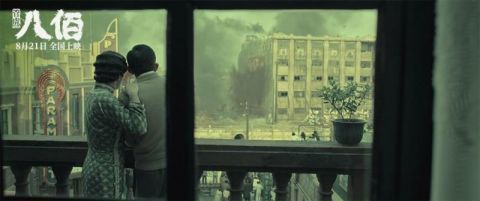
Despite being a member of the post-85’s, Yu Fei is actually a “veteran” of the film circles. It is the 10th year since she joined the industry. Her eyes brightened when talking about The Eight Hundred, “I’ve pushed myself to the limits for the work. From either the industrial or historical perspective, I do hope that the film could draw more attention from people”.
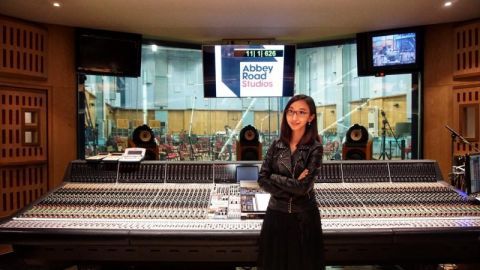
“Director Guan Hu has granted me much space for creation”
One who has watched The Eight Hundred may find it difficult to associate the powerful music with such a petite woman. Even Guan Hu admitted in awe that “no one has imagined that such strong music is created by a woman”. However, Yu Fei didn’t see her accomplishment had anything to do with gender. Rather, it was a good understanding of the director's intention that has helped her achieve a better outcome: “I have previously worked on movies with elements of war, but it is really my first time to deal with a pure war movie like The Eight Hundred. As far as I am concerned, music is the easy part as long as I understand the director’s intention and perceive the information conveyed by all the images that have been shot”.
Despite being an unfamiliar name to outsiders, Yu Fei actually constantly receives high remarks in the film and music circles whenever her name is mentioned. Prior to joining the production crew of The Eight Hundred, she had already served as music director and producer in an array of popular films like Go Away, Mr. Tumor, Ghost Blows Out: The Nine-Story Demon Tower, Animal World and Looking Up, and contributed to music production for high grossing movies like Tiny Times 4, My Sunshine, Let the Bullets Fly and The Orphan of Zhao.
With prior experience in music production for multiple movies, Yu Fei has never been short of opportunities. It was also upon an invitation that she decided to join The Eight Hundred. “I generally intervene when the script of a movie is being developed, so that all things go as the music that I have designed. However, the shooting of the film was almost over when director Guan Hu invited me. That was why I didn’t make the decision as soon as I received the invitation”, said Yu Fei.
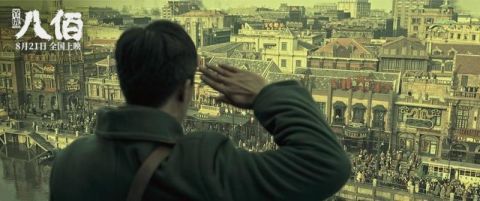
Actually, the decision was not made until Yu Fei watched The Eight Hundred for the first time at Guang Hu’s studio in March 2018. The film, despite being the director's cut version lasting 5 hours without any post-production editing, she was still moved to tears. “This is a film that matters a lot for every one of us as Chinese, and for that sake, I would accept the commission by all means”.
In the cooperation, director Guan Hu provided Yu Fei with much freedom for creation. “The director is a man of probity. He is more like a child when he is fully engaged in work. Our communication was simple: he would tell you his insights and ideas about creation, and looked forward to hearing your thoughts. As a matter of fact, it didn’t occur to me in the beginning that the director would truly allow me to do whatever I want, but he really did. So I am really grateful for that. This time, I've managed to materialize most of my ideas. Of course, it is not without regrets, but at least within the current scope of practice, I’ve pushed myself to the limit”, said Yu Fei.
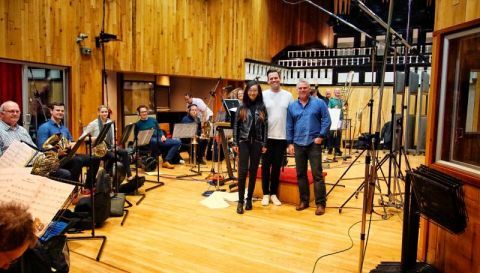
“Creating music for The Eight Hundred has been a process of minimization”.
Music supervisor is a commonly seen position in Hollywood. In China, however, the responsibility is often concurrently assumed by composers. Yu Fei said that to some extent, a film music supervisor is more like a music director that designs and produces musical pieces needed by the entire film, with responsibilities ranging from design music based on film plots, organizing and allocating product budgets and resources, finding composers and performers, and supervising the recording, mixing and post-production of master tapes. In other words, musical presentation in the entire film is related to the position.
The sheer size of the film The Eight Hundred means extraordinary workloads and pressure. In the interview, Yu Fei said that she must be very cautious about every aspect of the project from selecting composers to each design piece, and there was much decision-making in the process.
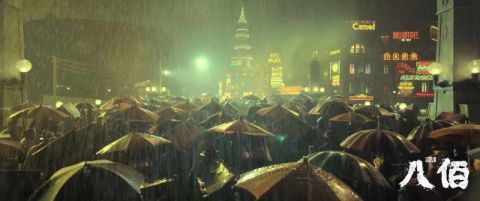
In typical practices, a composer should write a theme music first about the leading characters. However, for a film portraying a group of characters like The Eight Hundred, identifying a theme music was not an easy thing to do for Yu Fei. “Instead of making one character more prominent than others, the director wanted to highlight each and every living individual in the movie. Nonetheless, it was not realistic to compose a piece of theme music for each character”, said Yu Fei.
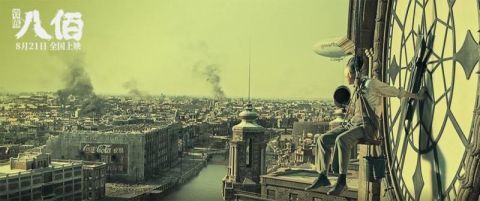
After several rounds of debates, Yu Fei came up with an idea: why not make a uniform music theme for all soldiers with distinct and positive melody, and another theme for the enemy with different sound effects? The seemingly odd solution, however, was accepted by the director.
To make the music more aptly fit the background of the times and the storyline of The Eight Hundred, Yu Fei carried out intensive research. She sent thousands of Chinese works to composers, hoping that they could find some inspiration. Additionally, she also did in-depth and detailed research of the background music for the first appearance of each character in the film. “The ladies playing mahjong in Shanghai probably listen to the so-called pop music at the time. The owner of the casino who is dressed in formal suits may listen to foreign records, so we picked up a piece of Jazz in the version before 1937. While selecting the arias of Peking Opera, we also hired traditional opera specialist to guide us through script writing”, said Yu Fei.
Another difficulty that Yu Fei encountered was the application of music. It is very likely to infiltrate music in a war movie everywhere. To avoid the problem, Yu Fei said, “When I initially went into the industry, I felt the more intensively music was applied, the better. But now I believe that good film music is imperceptible. If the audience notice the ups and downs of music, it means that all their attention has been drawn to the music. Actually, the audience should focus their attention on the development of the story. That’s why music should be held back or set free when necessary. This is actually a process of minimization, a very difficult thing to do”.
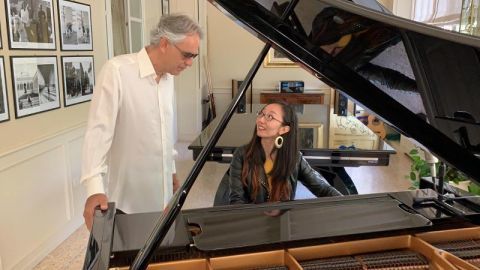
“I hope that the film could draw more attention from people.”
The Remembering, the ending theme of The Eight Hundred, was released globally on August 11, which instantly drew intensive attention from the Internet. The song was adapted from the Irish folk song Londondery Air, the melody of which is presented earlier to the audience through a soldier’s harmonica performance. Yu Fei admitted that the scene was actually advised by a military advisor during the filming stage – the 88th Division was German-trained elite forces armed by German weaponry, and most of the songs sung by soldiers in their everyday training were adopted from or simply imitated European folk music. During the January 28th Incident in 1932, the 88th Division was stationed in Shanghai, and was subsequently reallocated in Wuxi and Suzhou. Given high intellectual and educational levels and large numbers of missionaries in these areas, it is appropriate and apt to highlight the “special” identities of soldiers and officers of the division by a few foreign ditties.
Coincidentally, the previously-mentioned famous song Danny Boy, which is also based on the Londonderry Air, portrays a father’s regret of parting, as well as deep love to, his son who is about to join the army. The beautiful, mellifluous melody bearing with it a slight touch of sadness can easily evoke people’s compassion in the face of all the sufferings of the war.
It was the use of the melody of Londonderry Air in the shooting process that prompt Yu Fei to reuse it in the ending theme of The Eight Hundred with a view of forming an inclusion. Starting, again, with a harmonica performance, the song is a duet sounding like a conversation between north and south banks, the call between the realms of the living and the dead, and the aspiration and prayer for peace amid the hellish battleground. The idea was also supported by the director.
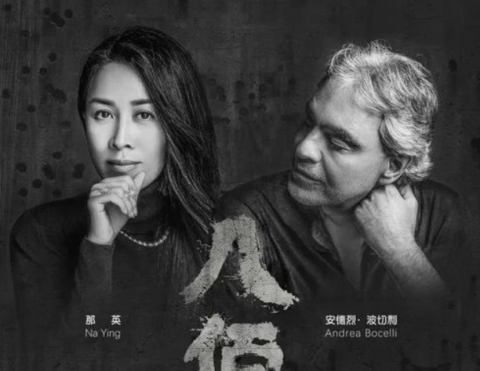
Na Ying, the queen of Chinese music, and Andrea Bocelli, a world-renowned tenor singer, were invited to sing the song, which was also the first time both singers cooperated with each other. Yu Fei said, “I wanted to attract more attention towards the film from either an industrial or historical perspective. So I decided to invite Mr. Bocelli, a cross-niche classic and pop music singer who has a great reputation around the world. Despite being a visually impaired star, he has made immense contributions to charity and enjoys substantial influence. To match the star, a woman singer with a powerful and story-telling voice should be found. We soon made a decision that it had to be Na Ying”.
Yu Fei acknowledged that both artists demonstrated a high level of dedication and professionalism. To perfectly complete the recording of this duet, Andrea Bocelli repeatedly listened to the pre-recorded demo of the song and was eventually able to fluently recite the entire lyric of the song. When recording the ending line “I can die with no regrets, Because your smile always fills my heart”, Yu Fei told Bocelli that the Chinese word “weixiao” meant “smile”, and every time he sang the line, the corners of his mouth would voluntarily go up – the genuine emotions were very touching.
Yu Fei said that it was on an Italian ship that Bocelli finished the recording of the song. Despite being blind, he was able to perceive the pleasant atmosphere of his surroundings, which made him relax and led to better performance. Na Ying, on the other hand, had already had her part recorded. But when she listened to Bocelli’s part, she went back to the studio and assisted Bocelli until he achieved the best state of performance in the recording process.
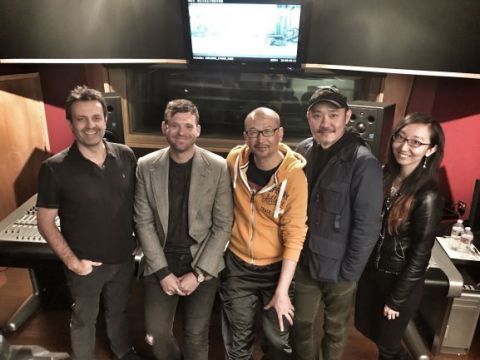
“For some genres, Chinese film music is more spot-on than its foreign counterparts”
After graduating from the major of Music Recording and Film and Television Music Creation at Beijing Film Academy, Yu Fei served at the Sound and Image Center of China Film Group Corporation (CFGC), where she was responsible for music editing. The three years’ worth of work experience at CFGC helped her establish broad connections with top-tier directors. She admitted that that period of experience marked a great help for her subsequent career as a music supervisor. “At that time, I was even required to be responsible for dialogues. Sometimes, it was just boring. But the cumulative experience that I gained was immensely useful for my latter-day work. I am still grateful for that experience.”
Yu Fei later resigned from CFGC and applied for a master’s program in Sound Recording and Supervision at McGill University, Canada, making her the first Chinese student in the 35 years since the establishment of the department. At McGill University, She soon realized the immense gap between herself and others. In the two years of her studies, she slept less than 4 hours every day and immersed herself in intensive training, especially on the sensitivity of her ears to acoustic balance and her perception of music. All this training eventually enabled her to win awards at the 137th AES Convention in Los Angeles and the 138th Audio Engineering Society Convention in Warsaw (collectively referred to as the “AES”), making the first Asian winning the awards in two consecutive terms.
In today’s film industry, the role of film music supervisor means a tremendous intensity of work and stress. Yu Fei admitted that the largest part of pressure actually came from herself. In the case of The Eight Hundred, however, the largest source of stress was not from work itself but from a hyperexcited state of work: “It was early morning when I finish up my music work every day. Different from other films, The Eight Hundred requires music that ignites people, making me feel as if I were to save the world. There was no way to fall asleep after completing a day’s work”.
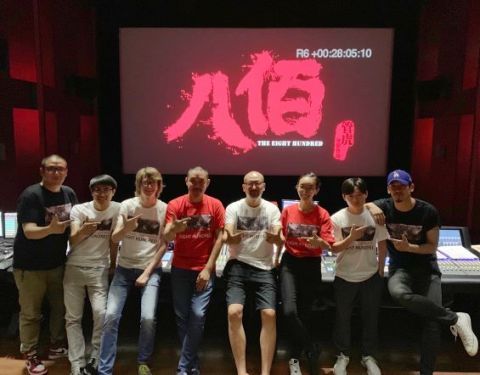
When asked how to deal with such pressures, Yu Fei said with a life that “after coming through two years of tough research life overseas, there is nothing that I cannot get over, because I know that is what I want to do. It often occurs to me that at least there is one more person who struggles more than me, and that person is the director”.
With work experience in both China and abroad, Yu Fei has her own insights to film music. She believes that “there is indeed a gap, but it is closing”, and “we also have many great composers, many of whom have a background of overseas education or have spent years in the industry and accumulated a large multitude of experience. I think the gap is gradually closing and for some genres, for example, some local stories or traditional themes, Chinese composers are even more productive and more likely to produce spot-on music than their foreign counterparts”.
